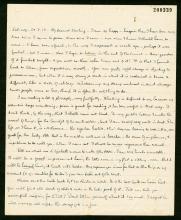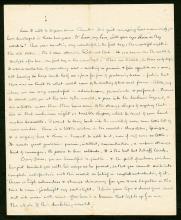BRACERS Record Detail for 19350
To access the original letter, email the Russell Archives.
"Sat. evg." "Reading [philosophy context] is difficult to me, because my attention keeps wandering; prison is good for reading, and has been useful in that way."
"The Single Tax" (little essay).
There are four transcriptions of this letter (documents .052437, record 99910 and .201138, record 116281; documents .201162 (ribbon) record 116280 and .052399 (carbon) record 99865 -- literary letter no. 52, page 73). The first two are the most complete, although some sentences have been deleted and new ones added; these transcriptions are different typings, although they contain the same text. The latter two contain fragments of the last part of the letter with some re-working of the text. A sentence typed in both has been struck out of document . 201162. The sentences about "rim of the world" and "Heraclitus" are in After Ten Years, p. 126, grouped with sentences from document .200313, record 18318; and document .200317, record 19321. They also appear in Malleson's essay "Fifty Years: 1916-1966" in Bertrand Russell, Philosopher of the Century, p. 21. The paragraph is similar to After Ten Years but some text has been removed.
According to Malleson this paragraph has been published in 3 books. [Source for this remark?] The source of her remark on publication and the third book have not been located as of 23 November 2017.
Letter 81
BR TO CONSTANCE MALLESON, 24 AUG. 1918
BRACERS 19350. AL. McMaster
Previous Brixton letter, BRACERS 81177; next letter, BRACERS 19351
Edited by K. Blackwell, A. Bone, N. Griffin and S. Turcon
<Brixton Prison>1
Sat. evg. 24.8.18.
My dearest Darling
I am so happy — happier than I have been any time since I came to prison. Ever since I came — ever since I knew I should have to come — I have been afraid, in the way I expressed a week ago — perhaps it was foolish, but I was. Now I begin to believe in the end of the tunnel — three-quarters of it finished tonight2 — and you will be there when I come out of it! It is that I found hard to believe, from superstition mostly. You are quite right always in objecting to possessiveness;3 but when it is very strong, a state in which it is restrained is tense and difficult, like a state of celibacy. Restraining any strong natural instinct always twists people more or less, though it is often the only thing to do.
I am reading a lot of philosophy, very fruitfully. Reading is difficult to me, because my attention keeps wandering; prison is good for reading, and has been useful in that way. I don’t think, by the way, that I shall come out tired. In my public letters4 I make the worst of things, for the benefit of the authorities, but I am really very well indeed. The life, as I have it, is wholesome — the regular habits, tho’ they are boring to extinction, are good for the body. All that is the matter with me is boredom, the sense of impotence, and impatience to be with you. When I come out I shall be more vigorous than usual.
Tell me what use Elizabeth means to make of the Attic.5 I am sorry I made a muddle.6 It will be a great improvement having the little room in my flat a sitting-room. And it will be heavenly having it lined with books. Any expenses you incur for that or other things on my account (e.g. candles for Studio) you can take out of the rent.
Please send this book back by Miss Rinder on Wed. It is the best book we have had.7 You will find all sorts of odds and ends in the later parts of it. Tell me, did you accomplish anything for Eliot?8 Don’t bother yourself about it too much. I expect he will manage all right, she9 always gets in a fuss.
Soon it will be 2 years since Canuto’s.10 It is quite amazing how enormously you have developed in those two years. O Love, my Love, will your eyes shine as they used to? There was something very wonderful in the first days: the moonlight nights in the old Attic11 — the 2 rain-storms in Richmond Park.12 Do you remember the walk by starlight after tea, our first day in the country?13— When we kissed, in those early days, it was a revelation of something new — meeting a passion and fire equal to one’s own, not having to keep back one’s force for fear of producing terror — feeling that there was no limit to what could come of the meeting of two such forces. Colette, my Dear, you are very wonderful — adventurous, passionate and profound. I want to stand with you at the rim of the world,14 and peer into the darkness beyond, and see a little more than others have seen of the strange shapes of mystery that live in that unknown night — terrible shapes, which the touch of your hand makes bearable. I want to bring back into the world of men some little bit of new wisdom. There is a little wisdom in the world: Heraclitus,15 Spinoza,16 and a saying here and there. I want to add to it, even if only ever so little. It needs great qualities: passion, intellect, concentration, a certain strange kind of courage, the power to bear solitude. It is this last that I chiefly lack.
O my Dear, you are beautiful and gentle — and the spirit of unknown wisdom has just touched you with his wings as he passed, so that you cannot sink into complete satisfaction with this world or belief in complete understanding of it. There is high adventure and strange discovery for you and me together in the time to come. Goodnight my soul’s light. I kiss your lips and draw your soul out into union with mine. Your love is a beacon that lights up for me the whole of this darkling world.a
- 1
[document] The letter was edited from the unsigned, thrice-folded original in BR’s hand in the Malleson papers in the Russell Archives.
- 2
three-quarters of it finished tonight On the basis of this calculation, BR clearly projected an early release date of the beginning of October. For several weeks he had been mentioning 2 October as the date.
- 3
possessiveness BR had difficulty restraining his possessiveness. On 16 October 1917 (BRACERS 19231) he wrote about it in his letter and enclosed a separate manuscript (document 200218), “Possessiveness in Sex-Relations”. He returned to this theme in his letter of 16 January 1918 (BRACERS 19277), writing: “All will come right if … the grasping possessiveness in me is kept under.”
- 4
my public letters BR was still, apparently, writing a weekly letter (or “manifesto”, Letter 79). Parts of it were extracted and circulated to his friends.
- 5
Elizabeth means to make of the Attic Although BR’s sister-in-law, Elizabeth, rented the Attic (thus allowing Colette to move into BR’s Bury Street flat), she did not live there — instead she sublet it to Dorothy Wrinch.
- 6
I made a muddle Details of the “muddle” were presumably in the same letter in which Colette told him of her plans for the sitting-room. The letter does not seem to be extant.
- 7
best book we have had To conceal documents smuggled into and out of the prison.
- 8
accomplish anything for EliotColette did introduce T.S. Eliot to an American colonel she had met through her mother. Many years later Eliot recollected that this army officer, J. Mitchell, “was very suspicious of the introduction, and wanted to be quite sure that I was not ‘a socialist like Lady Malleson’” (Eliot to Colette, 5 Sept. 1961, BRACERS 131600). It is not clear what, if anything, resulted from their meeting at Russell Chambers on 11 September 1918, for, in the end, Eliot served very briefly in the US navy after being called up in the final weeks of the war.
- 9
she Presumably Eliot’s wife, Vivienne (1888–1947).
- 10
Canuto’s They dined together at Canuto’s restaurant on Baker Street and then went to Colette’s flat in Bernard Street, where their love affair began in the early morning hours of 24 September 1916.
- 11
the old Attic The flat at 43 Bernard Street that Colette was living in when they met.
- 12
2 rain-storms in Richmond Park They had spent a memorable day in Richmond Park early in their relationship, on 24 October 1916, Colette’s birthday (see BRACERS 112952). The following month, in Letter 100, BR again recollected their time in Richmond Park.
- 13
our first day in the country? Their first country walk took place on 1 October 1916 from Goring, Oxfordshire.
- 14
I want to stand with you at the rim of the world BR wrote similarly to Colette in Letter 103 and on 8 June 1919 (“I want to stand with you on the rim of the world”, BRACERS 19487).
- 15
Heraclitus On 20 February 1914, BR told Lucy Donnelly that “of all men that ever lived, Heraclitus is the most intimate to me” (SLBR 1: 495). In this BR was implicitly contrasting him with Plato, a philosopher with whom BR’s early work is often associated. “Yes,” he had told Ottoline a year earlier, “Plato is wonderful. But he is not intimate to me — I haven’t enough urbanity for him” (16 Sept. 1913; SLBR 1: 477). In addition to his lack of urbanity, BR’s adoption of an event ontology as part of his neutral monism in 1918 gave him a new reason to admire Heraclitus, for Heraclitus’s most famous metaphysical doctrine is that everything is in flux. BR even wrote out Heraclitus’s extant fragments for a friend (Helen Dudley’s sister, Katharine) (RA Rec. Acq. 27). Virtually nothing is known of the life of the pre-Socratic philosopher, but the fragments of his work reveal a love of strife, a hatred of democracy, and a contempt for mankind, traits which led BR later to revise his opinion (see the chapter on Heraclitus in HWP, p. 41). In 1937, writing again to Ottoline, BR put Heraclitus at the beginning of a long tradition which ended with Hitler (15 Feb., 1937; SLBR 2: 344). It seems that BR’s earlier admiration of Heraclitus was based on the latter’s scepticism and angry iconoclasm, and possibly his ethic of “proud asceticism” (HWP, p. 42). BR’s early knowledge of Heraclitus came from John Burnet’s Early Greek Philosophy (2nd ed. [London: A. and C. Black, 1908]; Russell’s library).
- 16
Spinoza Benedictus de Spinoza (1632–1677), rationalist philosopher. BR described Spinoza as “the noblest and most lovable of the great philosophers. Intellectually, some others have surpassed him, but ethically he is supreme” (HWP, p. 569). The persistence of BR’s admiration of Spinoza is shown by the fact that at the age of 92 BR declared: “Spinoza has been a great influence in my life and an influence of a practical sort” (transcript of filmed interview, pp. 12–13; cited in K. Blackwell, The Spinozistic Ethics of Bertrand Russell [London: Allen & Unwin, 1985], pp. 21–2).
Textual Notes
- a
… this darkling world. The handwriting of this letter is so even and invariable, and without insertions and deletions, that it could well be a fair copy from a draft.


